Sustainable and Ethical Tourism
VerifiedAdded on 2023/01/13
|9
|2677
|71
AI Summary
This report analyzes Brazil as a tourist destination and discusses the concept of sustainable and ethical tourism. It explores the impact of tourism on the economy, society, and environment. The report also identifies measures to analyze the impact of tourism and highlights the importance of sustainable development for the future of Brazilian tourism.
Contribute Materials
Your contribution can guide someone’s learning journey. Share your
documents today.
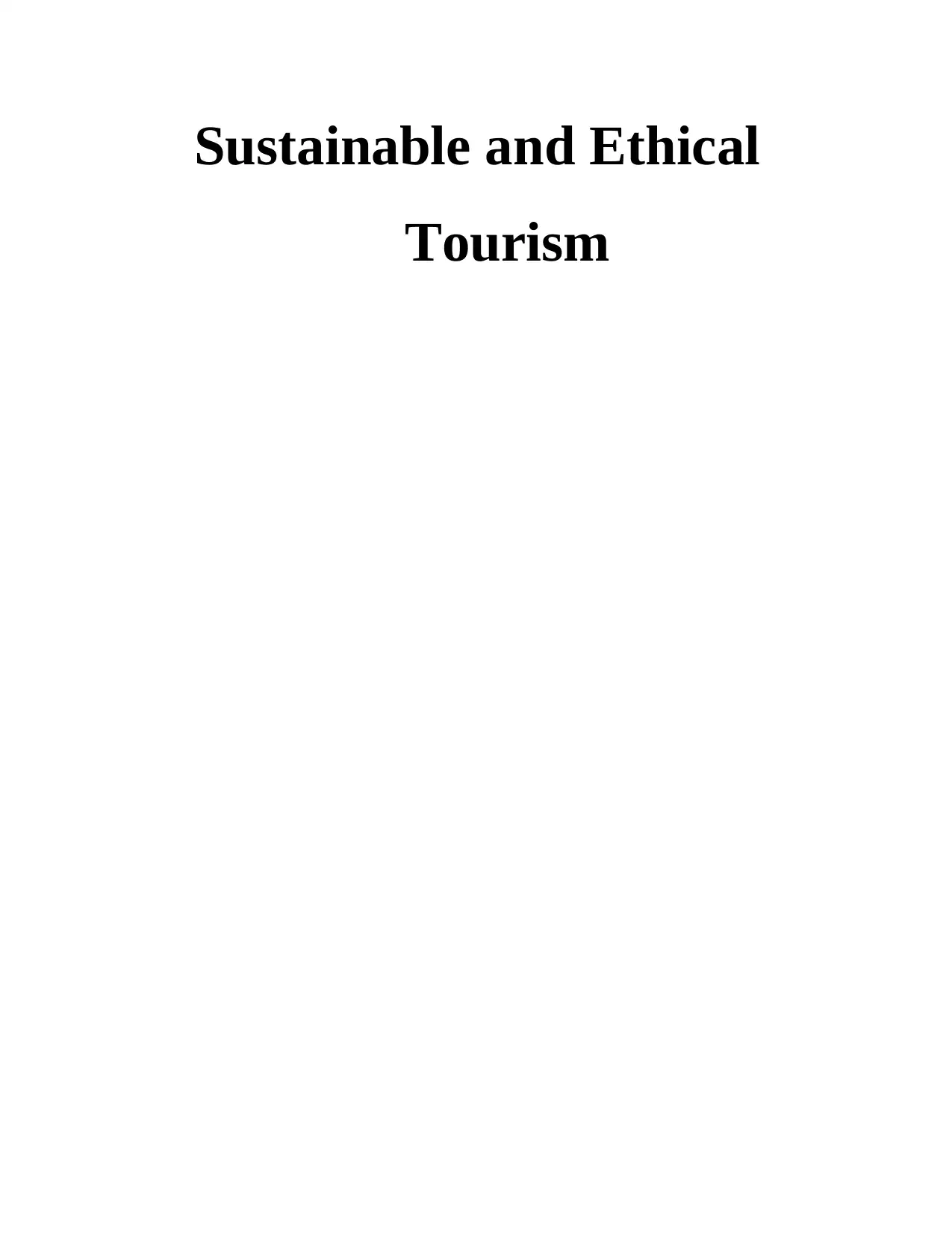
Sustainable and Ethical
Tourism
Tourism
Secure Best Marks with AI Grader
Need help grading? Try our AI Grader for instant feedback on your assignments.

Table of Contents
INTRODUCTION...........................................................................................................................3
Brazil as tourist destination..........................................................................................................3
Sustainability in Ethical Tourism.................................................................................................4
Identifying different measures through which impact of tourism can be analysed.....................6
CONCLUSION:..............................................................................................................................8
REFERENCES................................................................................................................................9
INTRODUCTION...........................................................................................................................3
Brazil as tourist destination..........................................................................................................3
Sustainability in Ethical Tourism.................................................................................................4
Identifying different measures through which impact of tourism can be analysed.....................6
CONCLUSION:..............................................................................................................................8
REFERENCES................................................................................................................................9
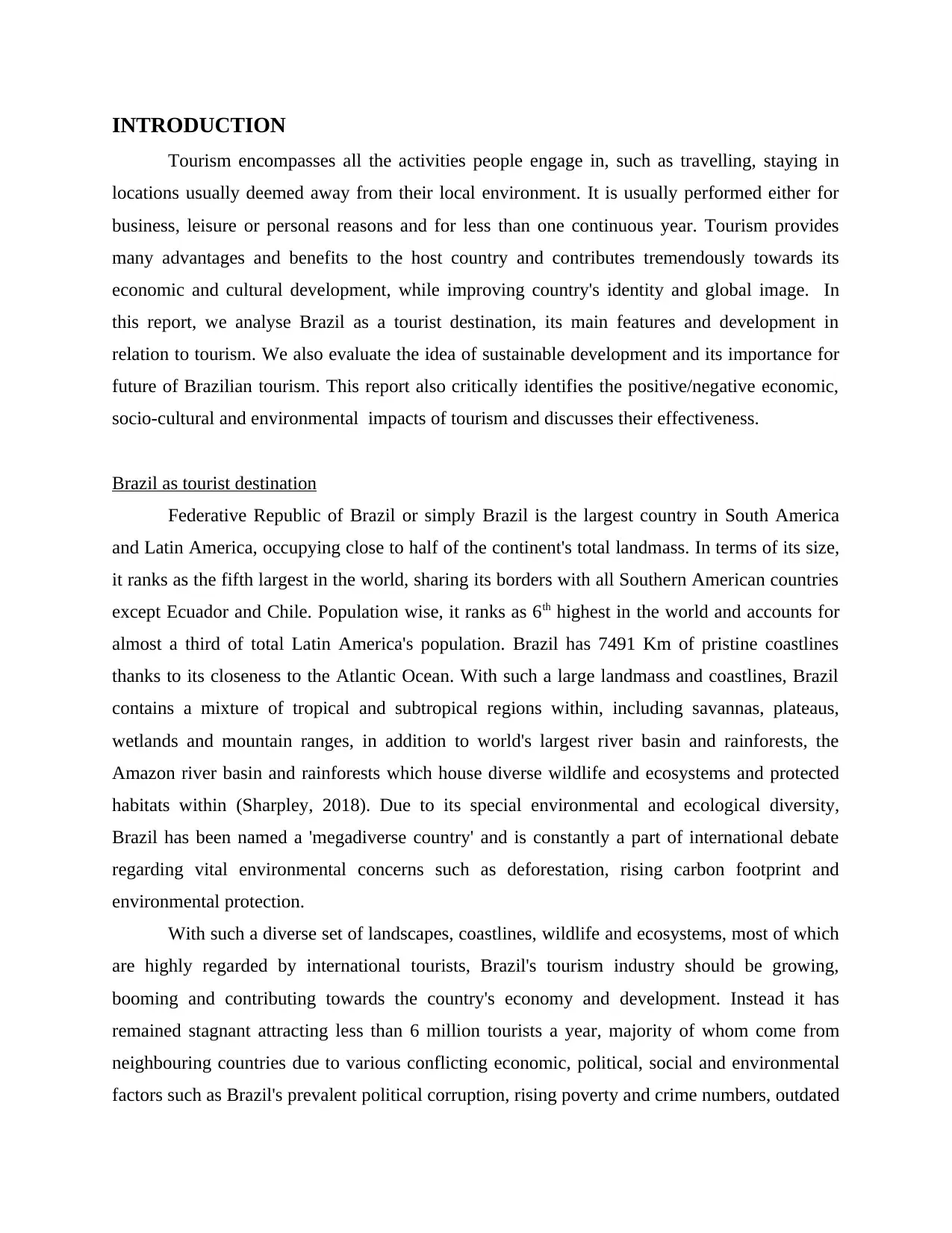
INTRODUCTION
Tourism encompasses all the activities people engage in, such as travelling, staying in
locations usually deemed away from their local environment. It is usually performed either for
business, leisure or personal reasons and for less than one continuous year. Tourism provides
many advantages and benefits to the host country and contributes tremendously towards its
economic and cultural development, while improving country's identity and global image. In
this report, we analyse Brazil as a tourist destination, its main features and development in
relation to tourism. We also evaluate the idea of sustainable development and its importance for
future of Brazilian tourism. This report also critically identifies the positive/negative economic,
socio-cultural and environmental impacts of tourism and discusses their effectiveness.
Brazil as tourist destination
Federative Republic of Brazil or simply Brazil is the largest country in South America
and Latin America, occupying close to half of the continent's total landmass. In terms of its size,
it ranks as the fifth largest in the world, sharing its borders with all Southern American countries
except Ecuador and Chile. Population wise, it ranks as 6th highest in the world and accounts for
almost a third of total Latin America's population. Brazil has 7491 Km of pristine coastlines
thanks to its closeness to the Atlantic Ocean. With such a large landmass and coastlines, Brazil
contains a mixture of tropical and subtropical regions within, including savannas, plateaus,
wetlands and mountain ranges, in addition to world's largest river basin and rainforests, the
Amazon river basin and rainforests which house diverse wildlife and ecosystems and protected
habitats within (Sharpley, 2018). Due to its special environmental and ecological diversity,
Brazil has been named a 'megadiverse country' and is constantly a part of international debate
regarding vital environmental concerns such as deforestation, rising carbon footprint and
environmental protection.
With such a diverse set of landscapes, coastlines, wildlife and ecosystems, most of which
are highly regarded by international tourists, Brazil's tourism industry should be growing,
booming and contributing towards the country's economy and development. Instead it has
remained stagnant attracting less than 6 million tourists a year, majority of whom come from
neighbouring countries due to various conflicting economic, political, social and environmental
factors such as Brazil's prevalent political corruption, rising poverty and crime numbers, outdated
Tourism encompasses all the activities people engage in, such as travelling, staying in
locations usually deemed away from their local environment. It is usually performed either for
business, leisure or personal reasons and for less than one continuous year. Tourism provides
many advantages and benefits to the host country and contributes tremendously towards its
economic and cultural development, while improving country's identity and global image. In
this report, we analyse Brazil as a tourist destination, its main features and development in
relation to tourism. We also evaluate the idea of sustainable development and its importance for
future of Brazilian tourism. This report also critically identifies the positive/negative economic,
socio-cultural and environmental impacts of tourism and discusses their effectiveness.
Brazil as tourist destination
Federative Republic of Brazil or simply Brazil is the largest country in South America
and Latin America, occupying close to half of the continent's total landmass. In terms of its size,
it ranks as the fifth largest in the world, sharing its borders with all Southern American countries
except Ecuador and Chile. Population wise, it ranks as 6th highest in the world and accounts for
almost a third of total Latin America's population. Brazil has 7491 Km of pristine coastlines
thanks to its closeness to the Atlantic Ocean. With such a large landmass and coastlines, Brazil
contains a mixture of tropical and subtropical regions within, including savannas, plateaus,
wetlands and mountain ranges, in addition to world's largest river basin and rainforests, the
Amazon river basin and rainforests which house diverse wildlife and ecosystems and protected
habitats within (Sharpley, 2018). Due to its special environmental and ecological diversity,
Brazil has been named a 'megadiverse country' and is constantly a part of international debate
regarding vital environmental concerns such as deforestation, rising carbon footprint and
environmental protection.
With such a diverse set of landscapes, coastlines, wildlife and ecosystems, most of which
are highly regarded by international tourists, Brazil's tourism industry should be growing,
booming and contributing towards the country's economy and development. Instead it has
remained stagnant attracting less than 6 million tourists a year, majority of whom come from
neighbouring countries due to various conflicting economic, political, social and environmental
factors such as Brazil's prevalent political corruption, rising poverty and crime numbers, outdated
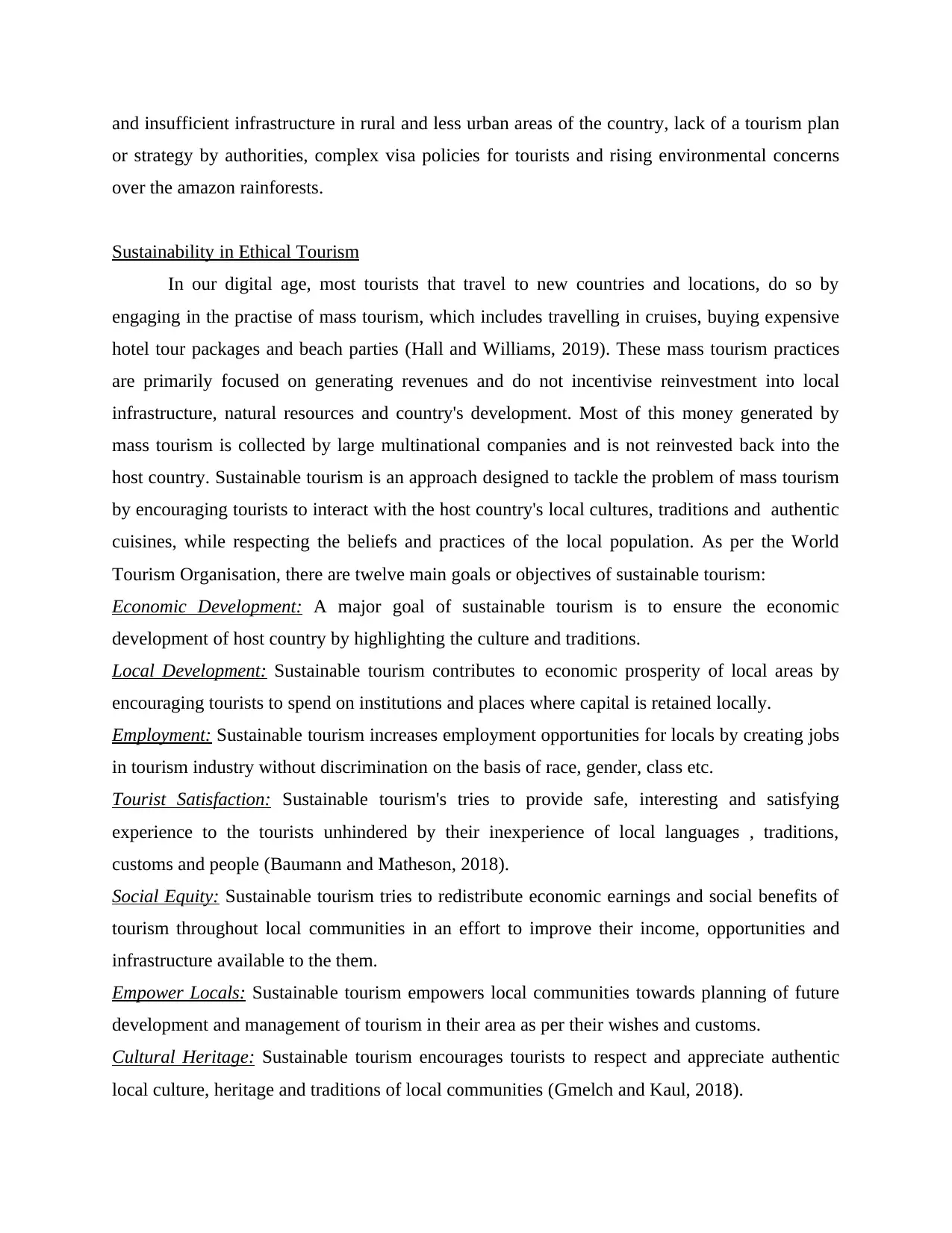
and insufficient infrastructure in rural and less urban areas of the country, lack of a tourism plan
or strategy by authorities, complex visa policies for tourists and rising environmental concerns
over the amazon rainforests.
Sustainability in Ethical Tourism
In our digital age, most tourists that travel to new countries and locations, do so by
engaging in the practise of mass tourism, which includes travelling in cruises, buying expensive
hotel tour packages and beach parties (Hall and Williams, 2019). These mass tourism practices
are primarily focused on generating revenues and do not incentivise reinvestment into local
infrastructure, natural resources and country's development. Most of this money generated by
mass tourism is collected by large multinational companies and is not reinvested back into the
host country. Sustainable tourism is an approach designed to tackle the problem of mass tourism
by encouraging tourists to interact with the host country's local cultures, traditions and authentic
cuisines, while respecting the beliefs and practices of the local population. As per the World
Tourism Organisation, there are twelve main goals or objectives of sustainable tourism:
Economic Development: A major goal of sustainable tourism is to ensure the economic
development of host country by highlighting the culture and traditions.
Local Development: Sustainable tourism contributes to economic prosperity of local areas by
encouraging tourists to spend on institutions and places where capital is retained locally.
Employment: Sustainable tourism increases employment opportunities for locals by creating jobs
in tourism industry without discrimination on the basis of race, gender, class etc.
Tourist Satisfaction: Sustainable tourism's tries to provide safe, interesting and satisfying
experience to the tourists unhindered by their inexperience of local languages , traditions,
customs and people (Baumann and Matheson, 2018).
Social Equity: Sustainable tourism tries to redistribute economic earnings and social benefits of
tourism throughout local communities in an effort to improve their income, opportunities and
infrastructure available to the them.
Empower Locals: Sustainable tourism empowers local communities towards planning of future
development and management of tourism in their area as per their wishes and customs.
Cultural Heritage: Sustainable tourism encourages tourists to respect and appreciate authentic
local culture, heritage and traditions of local communities (Gmelch and Kaul, 2018).
or strategy by authorities, complex visa policies for tourists and rising environmental concerns
over the amazon rainforests.
Sustainability in Ethical Tourism
In our digital age, most tourists that travel to new countries and locations, do so by
engaging in the practise of mass tourism, which includes travelling in cruises, buying expensive
hotel tour packages and beach parties (Hall and Williams, 2019). These mass tourism practices
are primarily focused on generating revenues and do not incentivise reinvestment into local
infrastructure, natural resources and country's development. Most of this money generated by
mass tourism is collected by large multinational companies and is not reinvested back into the
host country. Sustainable tourism is an approach designed to tackle the problem of mass tourism
by encouraging tourists to interact with the host country's local cultures, traditions and authentic
cuisines, while respecting the beliefs and practices of the local population. As per the World
Tourism Organisation, there are twelve main goals or objectives of sustainable tourism:
Economic Development: A major goal of sustainable tourism is to ensure the economic
development of host country by highlighting the culture and traditions.
Local Development: Sustainable tourism contributes to economic prosperity of local areas by
encouraging tourists to spend on institutions and places where capital is retained locally.
Employment: Sustainable tourism increases employment opportunities for locals by creating jobs
in tourism industry without discrimination on the basis of race, gender, class etc.
Tourist Satisfaction: Sustainable tourism's tries to provide safe, interesting and satisfying
experience to the tourists unhindered by their inexperience of local languages , traditions,
customs and people (Baumann and Matheson, 2018).
Social Equity: Sustainable tourism tries to redistribute economic earnings and social benefits of
tourism throughout local communities in an effort to improve their income, opportunities and
infrastructure available to the them.
Empower Locals: Sustainable tourism empowers local communities towards planning of future
development and management of tourism in their area as per their wishes and customs.
Cultural Heritage: Sustainable tourism encourages tourists to respect and appreciate authentic
local culture, heritage and traditions of local communities (Gmelch and Kaul, 2018).
Secure Best Marks with AI Grader
Need help grading? Try our AI Grader for instant feedback on your assignments.
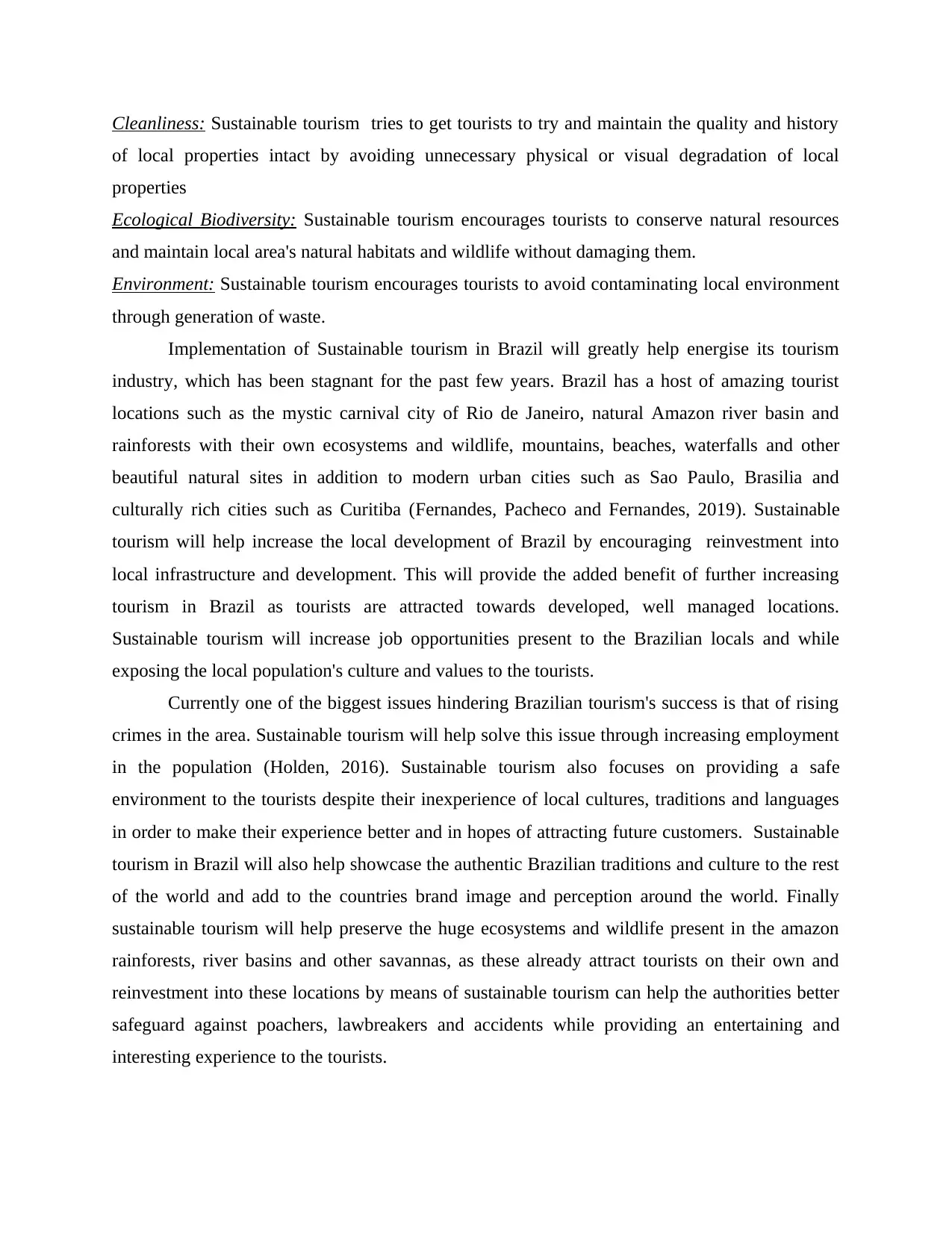
Cleanliness: Sustainable tourism tries to get tourists to try and maintain the quality and history
of local properties intact by avoiding unnecessary physical or visual degradation of local
properties
Ecological Biodiversity: Sustainable tourism encourages tourists to conserve natural resources
and maintain local area's natural habitats and wildlife without damaging them.
Environment: Sustainable tourism encourages tourists to avoid contaminating local environment
through generation of waste.
Implementation of Sustainable tourism in Brazil will greatly help energise its tourism
industry, which has been stagnant for the past few years. Brazil has a host of amazing tourist
locations such as the mystic carnival city of Rio de Janeiro, natural Amazon river basin and
rainforests with their own ecosystems and wildlife, mountains, beaches, waterfalls and other
beautiful natural sites in addition to modern urban cities such as Sao Paulo, Brasilia and
culturally rich cities such as Curitiba (Fernandes, Pacheco and Fernandes, 2019). Sustainable
tourism will help increase the local development of Brazil by encouraging reinvestment into
local infrastructure and development. This will provide the added benefit of further increasing
tourism in Brazil as tourists are attracted towards developed, well managed locations.
Sustainable tourism will increase job opportunities present to the Brazilian locals and while
exposing the local population's culture and values to the tourists.
Currently one of the biggest issues hindering Brazilian tourism's success is that of rising
crimes in the area. Sustainable tourism will help solve this issue through increasing employment
in the population (Holden, 2016). Sustainable tourism also focuses on providing a safe
environment to the tourists despite their inexperience of local cultures, traditions and languages
in order to make their experience better and in hopes of attracting future customers. Sustainable
tourism in Brazil will also help showcase the authentic Brazilian traditions and culture to the rest
of the world and add to the countries brand image and perception around the world. Finally
sustainable tourism will help preserve the huge ecosystems and wildlife present in the amazon
rainforests, river basins and other savannas, as these already attract tourists on their own and
reinvestment into these locations by means of sustainable tourism can help the authorities better
safeguard against poachers, lawbreakers and accidents while providing an entertaining and
interesting experience to the tourists.
of local properties intact by avoiding unnecessary physical or visual degradation of local
properties
Ecological Biodiversity: Sustainable tourism encourages tourists to conserve natural resources
and maintain local area's natural habitats and wildlife without damaging them.
Environment: Sustainable tourism encourages tourists to avoid contaminating local environment
through generation of waste.
Implementation of Sustainable tourism in Brazil will greatly help energise its tourism
industry, which has been stagnant for the past few years. Brazil has a host of amazing tourist
locations such as the mystic carnival city of Rio de Janeiro, natural Amazon river basin and
rainforests with their own ecosystems and wildlife, mountains, beaches, waterfalls and other
beautiful natural sites in addition to modern urban cities such as Sao Paulo, Brasilia and
culturally rich cities such as Curitiba (Fernandes, Pacheco and Fernandes, 2019). Sustainable
tourism will help increase the local development of Brazil by encouraging reinvestment into
local infrastructure and development. This will provide the added benefit of further increasing
tourism in Brazil as tourists are attracted towards developed, well managed locations.
Sustainable tourism will increase job opportunities present to the Brazilian locals and while
exposing the local population's culture and values to the tourists.
Currently one of the biggest issues hindering Brazilian tourism's success is that of rising
crimes in the area. Sustainable tourism will help solve this issue through increasing employment
in the population (Holden, 2016). Sustainable tourism also focuses on providing a safe
environment to the tourists despite their inexperience of local cultures, traditions and languages
in order to make their experience better and in hopes of attracting future customers. Sustainable
tourism in Brazil will also help showcase the authentic Brazilian traditions and culture to the rest
of the world and add to the countries brand image and perception around the world. Finally
sustainable tourism will help preserve the huge ecosystems and wildlife present in the amazon
rainforests, river basins and other savannas, as these already attract tourists on their own and
reinvestment into these locations by means of sustainable tourism can help the authorities better
safeguard against poachers, lawbreakers and accidents while providing an entertaining and
interesting experience to the tourists.
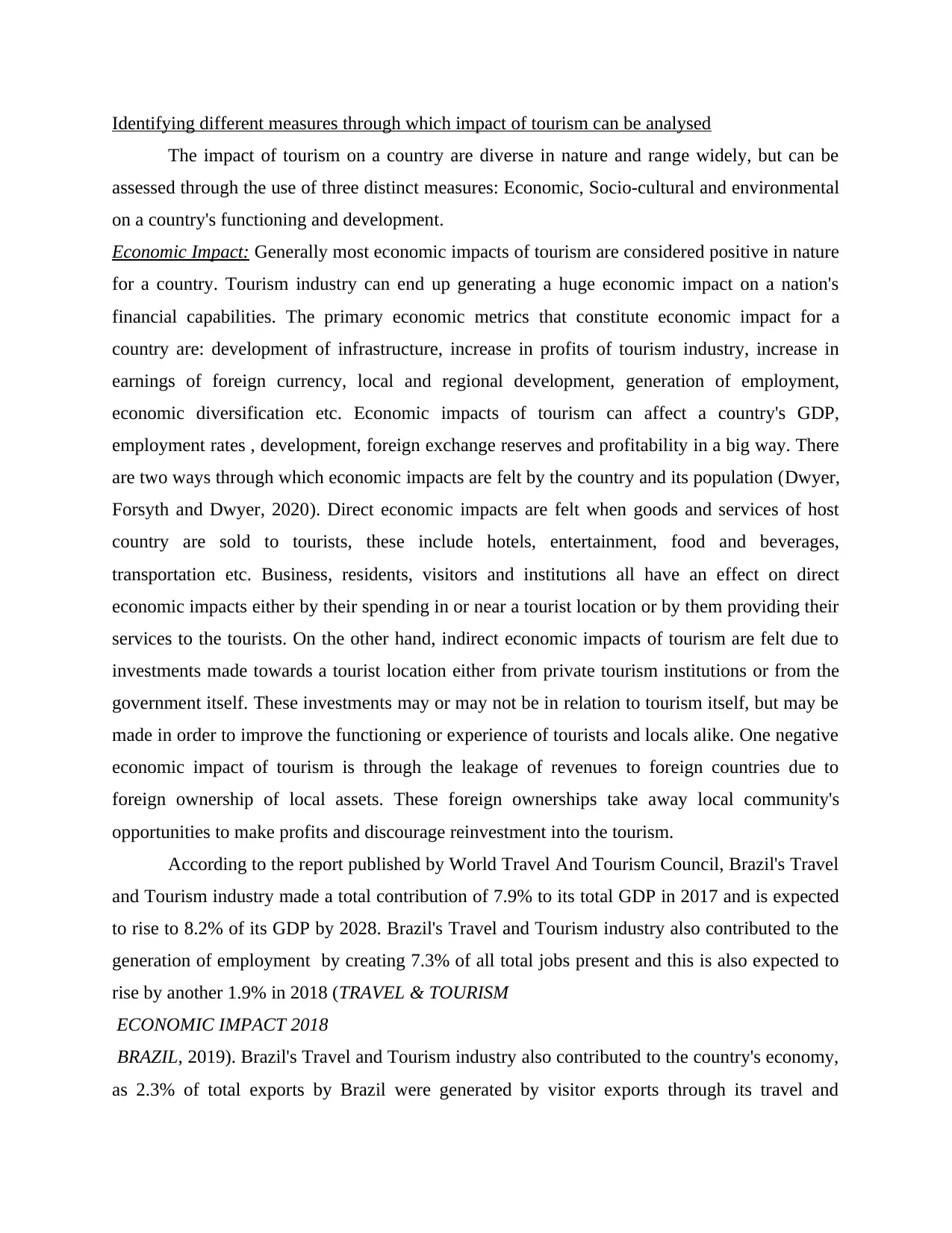
Identifying different measures through which impact of tourism can be analysed
The impact of tourism on a country are diverse in nature and range widely, but can be
assessed through the use of three distinct measures: Economic, Socio-cultural and environmental
on a country's functioning and development.
Economic Impact: Generally most economic impacts of tourism are considered positive in nature
for a country. Tourism industry can end up generating a huge economic impact on a nation's
financial capabilities. The primary economic metrics that constitute economic impact for a
country are: development of infrastructure, increase in profits of tourism industry, increase in
earnings of foreign currency, local and regional development, generation of employment,
economic diversification etc. Economic impacts of tourism can affect a country's GDP,
employment rates , development, foreign exchange reserves and profitability in a big way. There
are two ways through which economic impacts are felt by the country and its population (Dwyer,
Forsyth and Dwyer, 2020). Direct economic impacts are felt when goods and services of host
country are sold to tourists, these include hotels, entertainment, food and beverages,
transportation etc. Business, residents, visitors and institutions all have an effect on direct
economic impacts either by their spending in or near a tourist location or by them providing their
services to the tourists. On the other hand, indirect economic impacts of tourism are felt due to
investments made towards a tourist location either from private tourism institutions or from the
government itself. These investments may or may not be in relation to tourism itself, but may be
made in order to improve the functioning or experience of tourists and locals alike. One negative
economic impact of tourism is through the leakage of revenues to foreign countries due to
foreign ownership of local assets. These foreign ownerships take away local community's
opportunities to make profits and discourage reinvestment into the tourism.
According to the report published by World Travel And Tourism Council, Brazil's Travel
and Tourism industry made a total contribution of 7.9% to its total GDP in 2017 and is expected
to rise to 8.2% of its GDP by 2028. Brazil's Travel and Tourism industry also contributed to the
generation of employment by creating 7.3% of all total jobs present and this is also expected to
rise by another 1.9% in 2018 (TRAVEL & TOURISM
ECONOMIC IMPACT 2018
BRAZIL, 2019). Brazil's Travel and Tourism industry also contributed to the country's economy,
as 2.3% of total exports by Brazil were generated by visitor exports through its travel and
The impact of tourism on a country are diverse in nature and range widely, but can be
assessed through the use of three distinct measures: Economic, Socio-cultural and environmental
on a country's functioning and development.
Economic Impact: Generally most economic impacts of tourism are considered positive in nature
for a country. Tourism industry can end up generating a huge economic impact on a nation's
financial capabilities. The primary economic metrics that constitute economic impact for a
country are: development of infrastructure, increase in profits of tourism industry, increase in
earnings of foreign currency, local and regional development, generation of employment,
economic diversification etc. Economic impacts of tourism can affect a country's GDP,
employment rates , development, foreign exchange reserves and profitability in a big way. There
are two ways through which economic impacts are felt by the country and its population (Dwyer,
Forsyth and Dwyer, 2020). Direct economic impacts are felt when goods and services of host
country are sold to tourists, these include hotels, entertainment, food and beverages,
transportation etc. Business, residents, visitors and institutions all have an effect on direct
economic impacts either by their spending in or near a tourist location or by them providing their
services to the tourists. On the other hand, indirect economic impacts of tourism are felt due to
investments made towards a tourist location either from private tourism institutions or from the
government itself. These investments may or may not be in relation to tourism itself, but may be
made in order to improve the functioning or experience of tourists and locals alike. One negative
economic impact of tourism is through the leakage of revenues to foreign countries due to
foreign ownership of local assets. These foreign ownerships take away local community's
opportunities to make profits and discourage reinvestment into the tourism.
According to the report published by World Travel And Tourism Council, Brazil's Travel
and Tourism industry made a total contribution of 7.9% to its total GDP in 2017 and is expected
to rise to 8.2% of its GDP by 2028. Brazil's Travel and Tourism industry also contributed to the
generation of employment by creating 7.3% of all total jobs present and this is also expected to
rise by another 1.9% in 2018 (TRAVEL & TOURISM
ECONOMIC IMPACT 2018
BRAZIL, 2019). Brazil's Travel and Tourism industry also contributed to the country's economy,
as 2.3% of total exports by Brazil were generated by visitor exports through its travel and
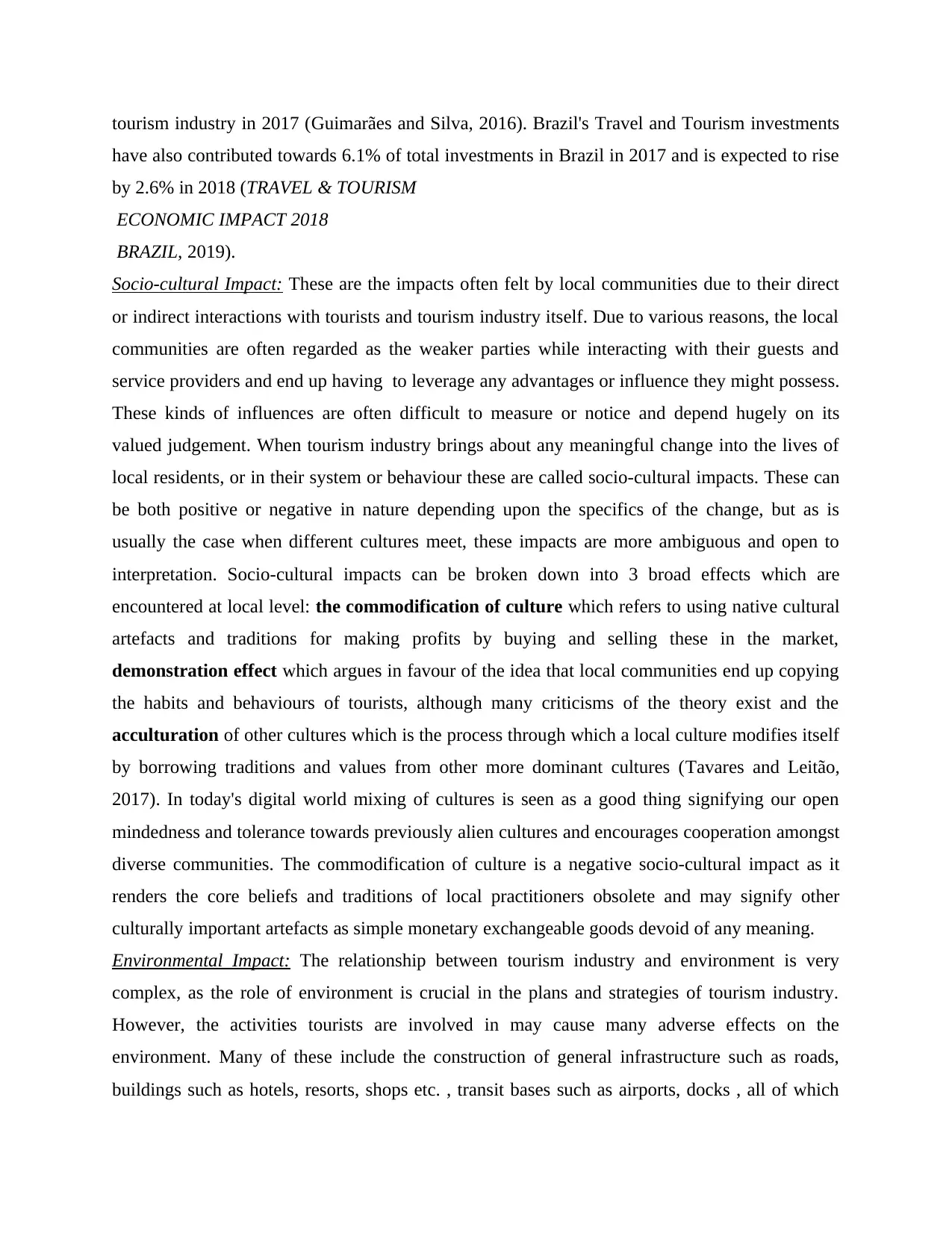
tourism industry in 2017 (Guimarães and Silva, 2016). Brazil's Travel and Tourism investments
have also contributed towards 6.1% of total investments in Brazil in 2017 and is expected to rise
by 2.6% in 2018 (TRAVEL & TOURISM
ECONOMIC IMPACT 2018
BRAZIL, 2019).
Socio-cultural Impact: These are the impacts often felt by local communities due to their direct
or indirect interactions with tourists and tourism industry itself. Due to various reasons, the local
communities are often regarded as the weaker parties while interacting with their guests and
service providers and end up having to leverage any advantages or influence they might possess.
These kinds of influences are often difficult to measure or notice and depend hugely on its
valued judgement. When tourism industry brings about any meaningful change into the lives of
local residents, or in their system or behaviour these are called socio-cultural impacts. These can
be both positive or negative in nature depending upon the specifics of the change, but as is
usually the case when different cultures meet, these impacts are more ambiguous and open to
interpretation. Socio-cultural impacts can be broken down into 3 broad effects which are
encountered at local level: the commodification of culture which refers to using native cultural
artefacts and traditions for making profits by buying and selling these in the market,
demonstration effect which argues in favour of the idea that local communities end up copying
the habits and behaviours of tourists, although many criticisms of the theory exist and the
acculturation of other cultures which is the process through which a local culture modifies itself
by borrowing traditions and values from other more dominant cultures (Tavares and Leitão,
2017). In today's digital world mixing of cultures is seen as a good thing signifying our open
mindedness and tolerance towards previously alien cultures and encourages cooperation amongst
diverse communities. The commodification of culture is a negative socio-cultural impact as it
renders the core beliefs and traditions of local practitioners obsolete and may signify other
culturally important artefacts as simple monetary exchangeable goods devoid of any meaning.
Environmental Impact: The relationship between tourism industry and environment is very
complex, as the role of environment is crucial in the plans and strategies of tourism industry.
However, the activities tourists are involved in may cause many adverse effects on the
environment. Many of these include the construction of general infrastructure such as roads,
buildings such as hotels, resorts, shops etc. , transit bases such as airports, docks , all of which
have also contributed towards 6.1% of total investments in Brazil in 2017 and is expected to rise
by 2.6% in 2018 (TRAVEL & TOURISM
ECONOMIC IMPACT 2018
BRAZIL, 2019).
Socio-cultural Impact: These are the impacts often felt by local communities due to their direct
or indirect interactions with tourists and tourism industry itself. Due to various reasons, the local
communities are often regarded as the weaker parties while interacting with their guests and
service providers and end up having to leverage any advantages or influence they might possess.
These kinds of influences are often difficult to measure or notice and depend hugely on its
valued judgement. When tourism industry brings about any meaningful change into the lives of
local residents, or in their system or behaviour these are called socio-cultural impacts. These can
be both positive or negative in nature depending upon the specifics of the change, but as is
usually the case when different cultures meet, these impacts are more ambiguous and open to
interpretation. Socio-cultural impacts can be broken down into 3 broad effects which are
encountered at local level: the commodification of culture which refers to using native cultural
artefacts and traditions for making profits by buying and selling these in the market,
demonstration effect which argues in favour of the idea that local communities end up copying
the habits and behaviours of tourists, although many criticisms of the theory exist and the
acculturation of other cultures which is the process through which a local culture modifies itself
by borrowing traditions and values from other more dominant cultures (Tavares and Leitão,
2017). In today's digital world mixing of cultures is seen as a good thing signifying our open
mindedness and tolerance towards previously alien cultures and encourages cooperation amongst
diverse communities. The commodification of culture is a negative socio-cultural impact as it
renders the core beliefs and traditions of local practitioners obsolete and may signify other
culturally important artefacts as simple monetary exchangeable goods devoid of any meaning.
Environmental Impact: The relationship between tourism industry and environment is very
complex, as the role of environment is crucial in the plans and strategies of tourism industry.
However, the activities tourists are involved in may cause many adverse effects on the
environment. Many of these include the construction of general infrastructure such as roads,
buildings such as hotels, resorts, shops etc. , transit bases such as airports, docks , all of which
Paraphrase This Document
Need a fresh take? Get an instant paraphrase of this document with our AI Paraphraser
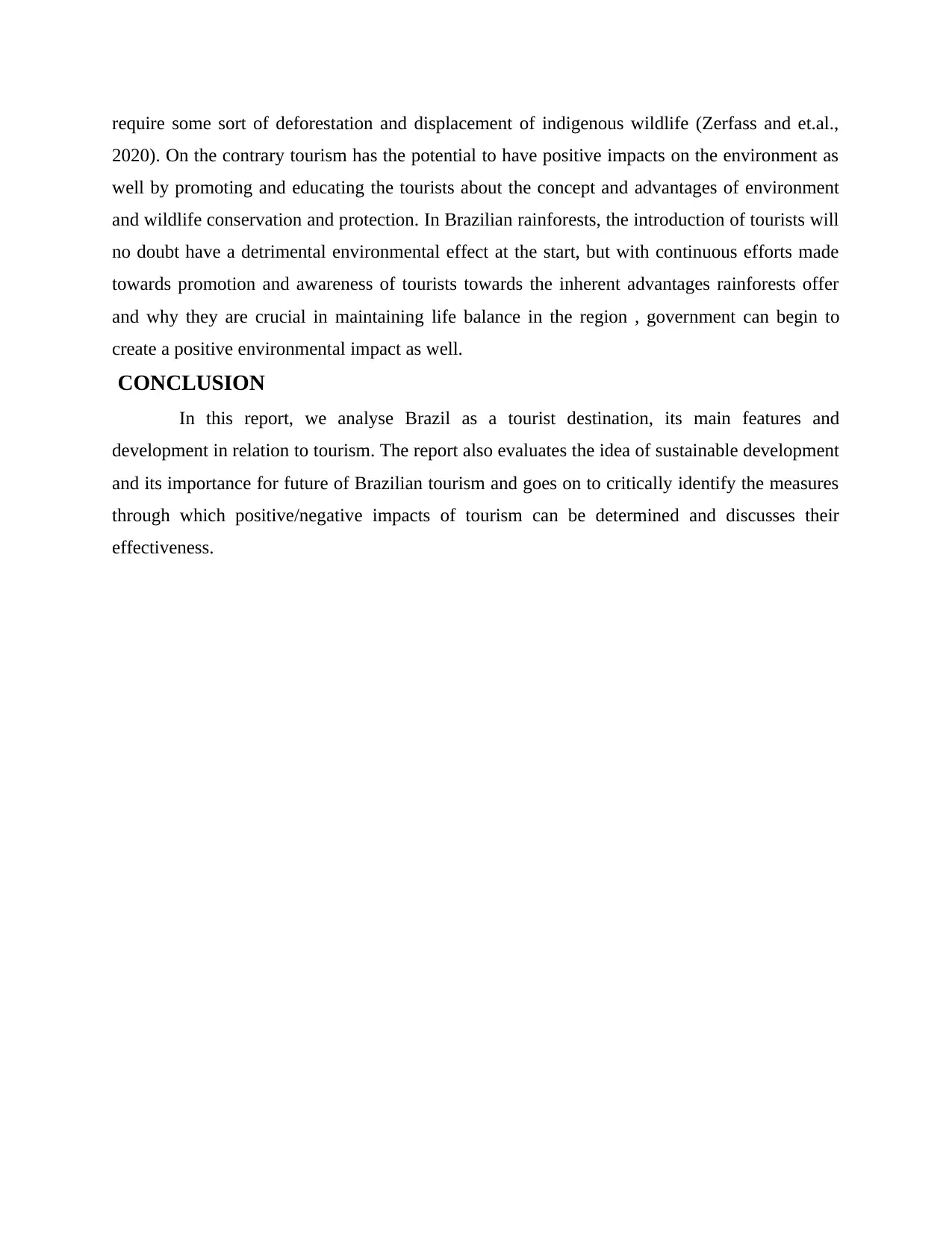
require some sort of deforestation and displacement of indigenous wildlife (Zerfass and et.al.,
2020). On the contrary tourism has the potential to have positive impacts on the environment as
well by promoting and educating the tourists about the concept and advantages of environment
and wildlife conservation and protection. In Brazilian rainforests, the introduction of tourists will
no doubt have a detrimental environmental effect at the start, but with continuous efforts made
towards promotion and awareness of tourists towards the inherent advantages rainforests offer
and why they are crucial in maintaining life balance in the region , government can begin to
create a positive environmental impact as well.
CONCLUSION
In this report, we analyse Brazil as a tourist destination, its main features and
development in relation to tourism. The report also evaluates the idea of sustainable development
and its importance for future of Brazilian tourism and goes on to critically identify the measures
through which positive/negative impacts of tourism can be determined and discusses their
effectiveness.
2020). On the contrary tourism has the potential to have positive impacts on the environment as
well by promoting and educating the tourists about the concept and advantages of environment
and wildlife conservation and protection. In Brazilian rainforests, the introduction of tourists will
no doubt have a detrimental environmental effect at the start, but with continuous efforts made
towards promotion and awareness of tourists towards the inherent advantages rainforests offer
and why they are crucial in maintaining life balance in the region , government can begin to
create a positive environmental impact as well.
CONCLUSION
In this report, we analyse Brazil as a tourist destination, its main features and
development in relation to tourism. The report also evaluates the idea of sustainable development
and its importance for future of Brazilian tourism and goes on to critically identify the measures
through which positive/negative impacts of tourism can be determined and discusses their
effectiveness.
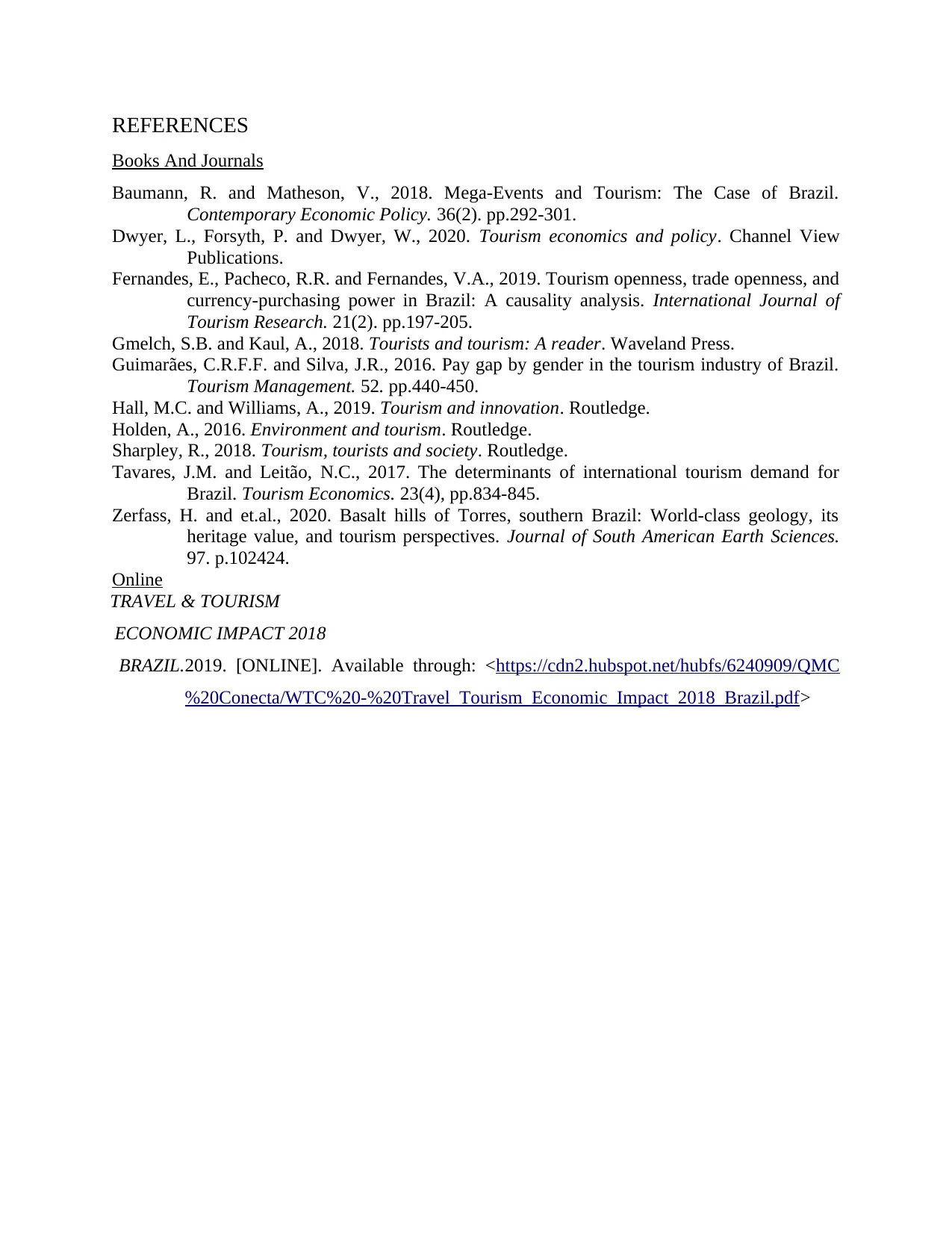
REFERENCES
Books And Journals
Baumann, R. and Matheson, V., 2018. Mega‐Events and Tourism: The Case of Brazil.
Contemporary Economic Policy. 36(2). pp.292-301.
Dwyer, L., Forsyth, P. and Dwyer, W., 2020. Tourism economics and policy. Channel View
Publications.
Fernandes, E., Pacheco, R.R. and Fernandes, V.A., 2019. Tourism openness, trade openness, and
currency‐purchasing power in Brazil: A causality analysis. International Journal of
Tourism Research. 21(2). pp.197-205.
Gmelch, S.B. and Kaul, A., 2018. Tourists and tourism: A reader. Waveland Press.
Guimarães, C.R.F.F. and Silva, J.R., 2016. Pay gap by gender in the tourism industry of Brazil.
Tourism Management. 52. pp.440-450.
Hall, M.C. and Williams, A., 2019. Tourism and innovation. Routledge.
Holden, A., 2016. Environment and tourism. Routledge.
Sharpley, R., 2018. Tourism, tourists and society. Routledge.
Tavares, J.M. and Leitão, N.C., 2017. The determinants of international tourism demand for
Brazil. Tourism Economics. 23(4), pp.834-845.
Zerfass, H. and et.al., 2020. Basalt hills of Torres, southern Brazil: World-class geology, its
heritage value, and tourism perspectives. Journal of South American Earth Sciences.
97. p.102424.
Online
TRAVEL & TOURISM
ECONOMIC IMPACT 2018
BRAZIL.2019. [ONLINE]. Available through: <https://cdn2.hubspot.net/hubfs/6240909/QMC
%20Conecta/WTC%20-%20Travel_Tourism_Economic_Impact_2018_Brazil.pdf>
Books And Journals
Baumann, R. and Matheson, V., 2018. Mega‐Events and Tourism: The Case of Brazil.
Contemporary Economic Policy. 36(2). pp.292-301.
Dwyer, L., Forsyth, P. and Dwyer, W., 2020. Tourism economics and policy. Channel View
Publications.
Fernandes, E., Pacheco, R.R. and Fernandes, V.A., 2019. Tourism openness, trade openness, and
currency‐purchasing power in Brazil: A causality analysis. International Journal of
Tourism Research. 21(2). pp.197-205.
Gmelch, S.B. and Kaul, A., 2018. Tourists and tourism: A reader. Waveland Press.
Guimarães, C.R.F.F. and Silva, J.R., 2016. Pay gap by gender in the tourism industry of Brazil.
Tourism Management. 52. pp.440-450.
Hall, M.C. and Williams, A., 2019. Tourism and innovation. Routledge.
Holden, A., 2016. Environment and tourism. Routledge.
Sharpley, R., 2018. Tourism, tourists and society. Routledge.
Tavares, J.M. and Leitão, N.C., 2017. The determinants of international tourism demand for
Brazil. Tourism Economics. 23(4), pp.834-845.
Zerfass, H. and et.al., 2020. Basalt hills of Torres, southern Brazil: World-class geology, its
heritage value, and tourism perspectives. Journal of South American Earth Sciences.
97. p.102424.
Online
TRAVEL & TOURISM
ECONOMIC IMPACT 2018
BRAZIL.2019. [ONLINE]. Available through: <https://cdn2.hubspot.net/hubfs/6240909/QMC
%20Conecta/WTC%20-%20Travel_Tourism_Economic_Impact_2018_Brazil.pdf>
1 out of 9
Related Documents
Your All-in-One AI-Powered Toolkit for Academic Success.
+13062052269
info@desklib.com
Available 24*7 on WhatsApp / Email
![[object Object]](/_next/static/media/star-bottom.7253800d.svg)
Unlock your academic potential
© 2024 | Zucol Services PVT LTD | All rights reserved.




